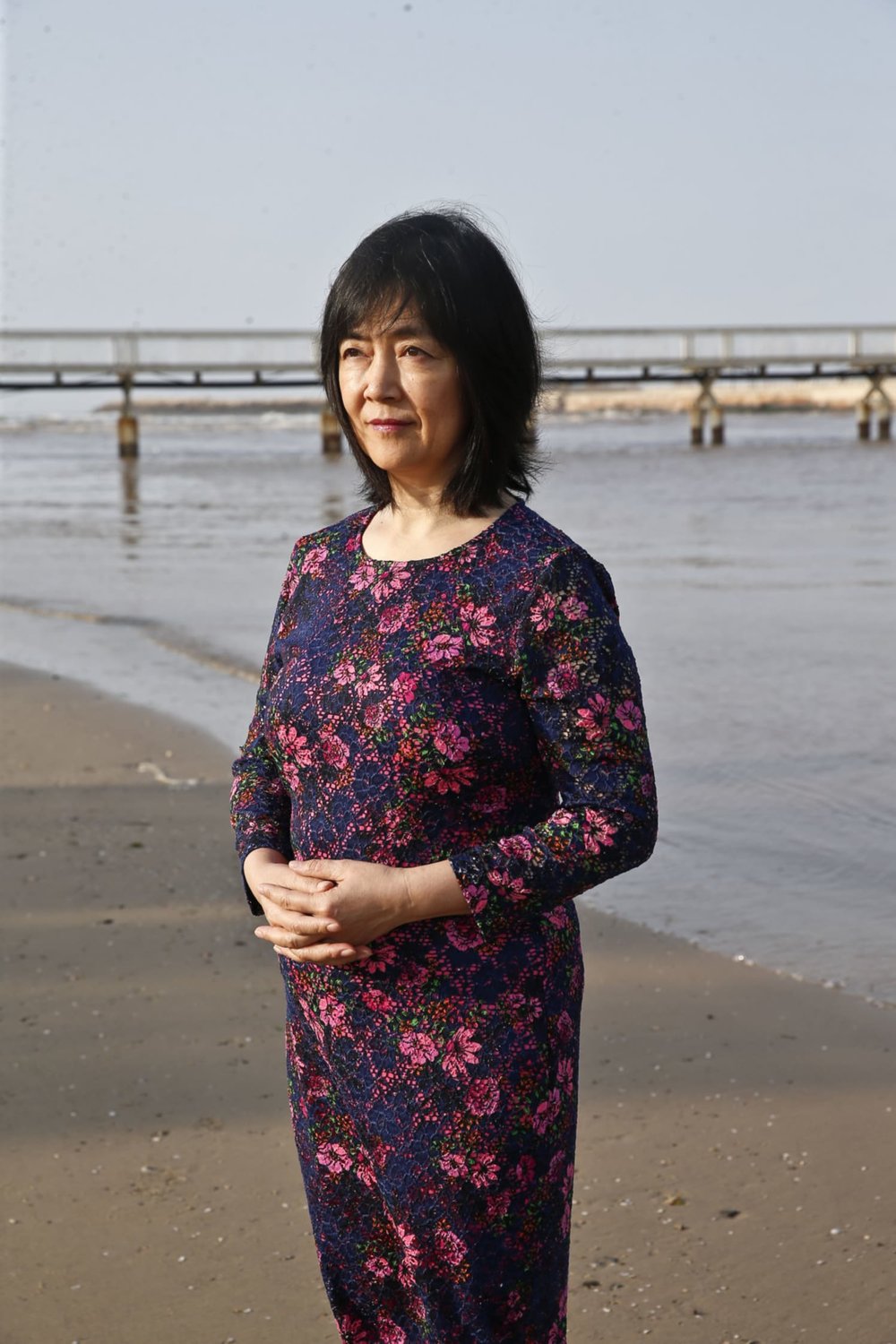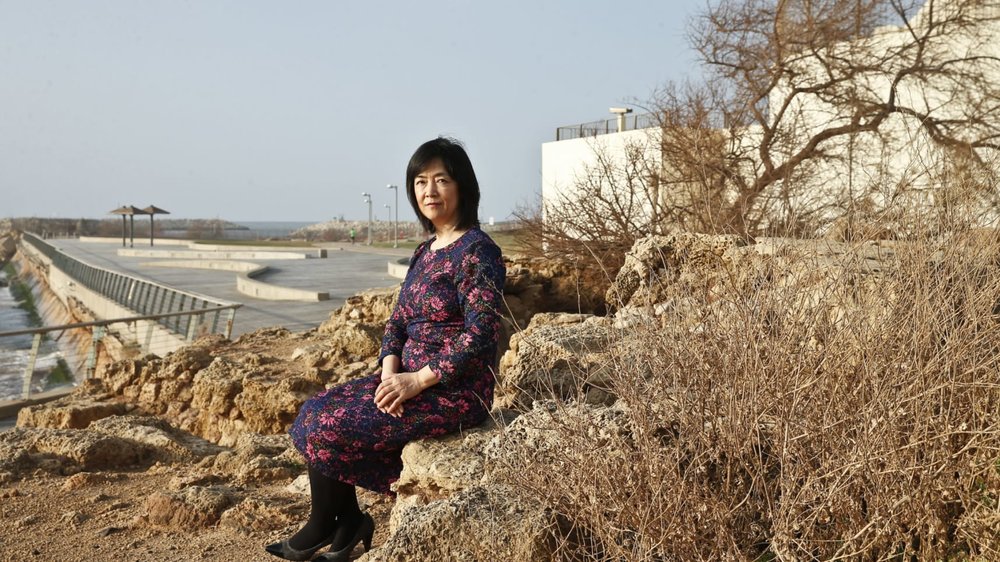With the documentary “Free China: The Courage to Believe,” Zeng, the principal subject of the film, came to Israel to talk about the persecution of those who practice Falun Gong
Nirit Anderman Feb 15, 2019 3:39 PM
The policemen entered Jennifer Zeng’s house at 2 in the morning; they woke her and her family and told her she was under arrest. “The leaders in Beijing have an eye on you,” one of them said. When she asked him what the official reason was for her arrest, he thought for a moment and said in all seriousness, “For your thoughts.”
Shortly afterward Zeng entered a labor camp – officially called a “reeducation camp” – in Beijing and the gates locked behind her. “On the first day they made us sit with our heads down, looking at our feet. They forced us to stay that way, unmoving, for 15 to 16 hours, in the sun, until it got dark. Many older women fainted. At a certain point I asked for a paper and pen to ask that they stop this, and when they heard this, two policemen came at me with electric prods. They pushed me outside, dragged me along the ground in the courtyard and used the electric prods all over my body. It was terrible, indescribable. I closed my eyes, I waited for it to be over, until in the end I lost consciousness.”

Jennifer Zeng. ‘It was clear, everyone in the camp knew we were there because we were Falun Gong.’Meged Gozny
Zeng at the time had a master’s degree in biochemistry and was part of China’s social elite. She was married and had a daughter, and was even a member of the Communist Party that has ruled China for 70 years. Her sole crime, she stresses, was that she belonged to the Falun Gong, a spiritual movement that combines exercises, meditation and the belief in three principles – truth, compassion and tolerance. Although the Chinese government had been supportive of the movement in the early 1990s, after a few years, in which it swept up so many followers, reaching 70 million and exceeding membership in the Communist Party, the government – which sees any mass movement as a threat to the regime – began to crack down.
The persecution of those who practice Falun Gong continues to this day and includes arrests made outside the official Chinese legal system and the use of reeducation camps. In the camps, according to human rights organizations, many Falun Gong members are tortured and subject to forced labor, in the best case, or subject to organ harvesting and murder, in the worst.
>> Israeli officials discount U.S. concerns over China: ‘The security warnings are a joke’
In the runup to the Tel Aviv Cinematheque’s screening last week of the documentary “Free China: The Courage to Believe,” Zeng, the principal subject of the film, was in Israel. She’s 52, and fled China immediately upon her release from the work camp, in 2001. Since then she has been devoted to increasing international awareness of the severe human rights violations taking place in her native land. She lives in Washington, has written a best-selling book (“Witnessing History: One Chinese Woman’s Fight for Freedom and Falun Gong”) in which she describes her experiences in the camp in detail, and accompanies screenings in other countries of the film in which she and another survivor tell their chilling stories. She is prepared to rummage publicly and repeatedly through her private trauma if it will make people wake up and fight the injustices taking place in China today.
Zeng was arrested four times by the Chinese authorities, and after the fourth time, in 2000, spent a year in one of the labor camps strewn throughout the country. “These camps are part of an entire system that’s outside the Chinese legal system. People are incarcerated in them without trial and without the ability to take a lawyer,” she explained, in an interview in Tel Aviv last week. “Anyone who has been in one of these camps and also in jail, says the camps are much worse, because there they make you do forced labor and don’t really care if you’re dead the next morning.”
When you were arrested, they told you it was for your thoughts. Were you ever told officially at any point that your arrest was for being a member of Falun Gong?
“It was clear, everyone in the camp knew we were there because we were Falun Gong. In the camp, when we’d ask one another ‘Why are you here?’ people would simply answer ‘Falun Gong.’ Everyone knew that it was connected to the government decision to fight the Falun Gong. I was arrested after the internet police intercepted a private email I’d written that included the words ‘Falun Gong.’ When I got to the labor camp, they presented that sentence I’d written during a trial they held for me there – that was my ‘crime.’ The police may not have the legal right to monitor citizens’ emails but they did, and they sentenced me to a year in the labor camp.”
Plush rabbit production
In the film Zeng describes the work in the camp. The female prisoners would leave for work at 5 A.M. without knowing when they would return to their cells. Sometimes it was 11 P.M. and sometimes it was midnight. In many cases there were expected to knit or sew, and in one case they were enlisted to make 100,000 rabbit dolls for Nestle. “It took more than 10 hours to make such a rabbit; the work camp got five cents for every unit, and we, of course, never got anything,” she says there.
But in her interview, she stresses that the main difficulty from her perspective was the constant pressure exerted on her to change her views. “They made it clear to us that we had to be reformed, meaning to change our views on Falun Gong; if we thought it was a good thing, then we had to understand that it was bad, that it harms the state. If you don’t change your views, they won’t release you.
Free China: The Courage to Believe Official Trailer
“There was no official torture room, but every minute there was torture. For example, there was a certain stage at which they didn’t let us sleep for several night in an effort to break us mentally. But even when I wasn’t being tortured I was terrified, because I thought to myself that my turn would come tomorrow. The emotional stress was tremendous and I saw people around me going mad. A woman I knew there, for example, whom they kept awake for four days straight, suddenly lost her mind. She started to laugh like a madwoman and said, ‘Oh, suddenly I understand, give me a piece of paper quick and I’ll sign anything you want.’”
In one of the most stomach-churning moments of the film, Zeng explains how her jailers took her and several other prisoners to a hospital one day for extensive medical examinations. At first she didn’t understand the logic; why were they torturing them on the one hand, while on the other they were investing a lot of money and time in medical tests? The explanation for this absurdity is horrifying: The tests were apparently being done to ascertain which prisoners would be candidates for organ harvesting. According to several investigations by journalists and Western human rights activists published over the years, Falun Gong prisoners (and prisoners in general) have frequently been executed in order to provide organs for China’s flourishing illegal transplant industry.
During her first six months in the camp, Zeng was determined to resist the pressures. She wasn’t prepared to betray her inner truth, she says, and she refused to renounce the values of Falun Gong. “There were many times when I was on the verge of losing my sanity. After long periods of sleep deprivation, I felt my will evaporate and that I was losing my sanity. I felt crazy, and those were very frightening moments.”
>> When it comes to China, Trump expects Israel to follow his lead | Analysis
It’s been years already that she has been telling her story over and over, and yet during the interview her voice repeatedly cracked and her eyes filled with tears. “After half a year in which I often felt on the verge of a nervous breakdown, I decided I would write a book that would expose what I went through there. Because on my first day in the camp, I couldn’t believe what was happening around me.
Because when I read about what happened in the Nazi concentration camps, I thought to myself, ‘That’s ancient history; humanity would never do such a thing again.’ But when I got to the work camp, I remembered those stories. I could believe that something like that could happen again, in the 21st century.”
Zeng realized that in order to tell the world the truth, she would have to get out of the camp alive. And to get out, she had to convince her captors that she had changed her views and no longer believed in the precepts of Falun Gong. “They gave me electric shocks until I lost consciousness, but the emotional struggle inside me was even more difficult. Because for someone who practices Falun Gong, to lie is like committing suicide. Still, I realized that if I didn’t lie, I wouldn’t be able to leave and expose the evil taking place there.”
She was required to sign a declaration that she no longer believed in the precepts of the Falun Gong, to write long articles explaining why the movement is dangerous, but even after she did so the nightmare wasn’t over. “Even afterwards, they still followed me for 24 hours [a day], even when I went to the bathroom. They would examine my facial expressions when I spoke to other Falun Gong members. I remember that I would say to myself ‘Don’t dream, don’t talk in your sleep,’ because they can report on that too. It’s terrible emotional stress, they test you repeatedly, and then they recruit you to help them to re-educate those who [still] practice Falun Gong.”
When Zeng was finally released from the camp, she fled to Australia and from there immigrated to the United States with her family. But thousands of such work camps are still scattered throughout China, she explains. In each of them there are hundreds or thousands of prisoners, many of whom are practitioners of Falun Gong.
This persecution has been going on for the past 20 years. Western countries are aware of the crimes taking place, but they don’t dare confront the arm of the Chinese giant. According to estimates, says Zeng, over 10 million people have gone through the camps during this period.
“Never in history have so many people been required to deny the most basic elements of being human: to give up your thoughts, your free will, your choice of what to think and what to believe in,” she says. “In other times and places, they robbed people of their capital, their freedom, but I think that no government has ever tried to take people’s thoughts away from them. And in my eyes, such a demand for change is the most terrible thing in human history. And it has been taking place in China for several years already on a huge, incomprehensible scale.

Jennifer Zeng in Israel. ‘They make you do forced labor and don’t really care if you’re dead the next morning.’Credit: Meged Gozny
Source: https://www.haaretz.com/israel-news/.premium-jennifer-zeng-wants-israelis-to-know-about-human-rights-violations-in-china-1.6936958?fbclid=IwAR3Jhfnrv0YgrqH2OHu7REb0ws8MEhATH9Mgp8dovJsHJzb7kC2SBCxXRBE
